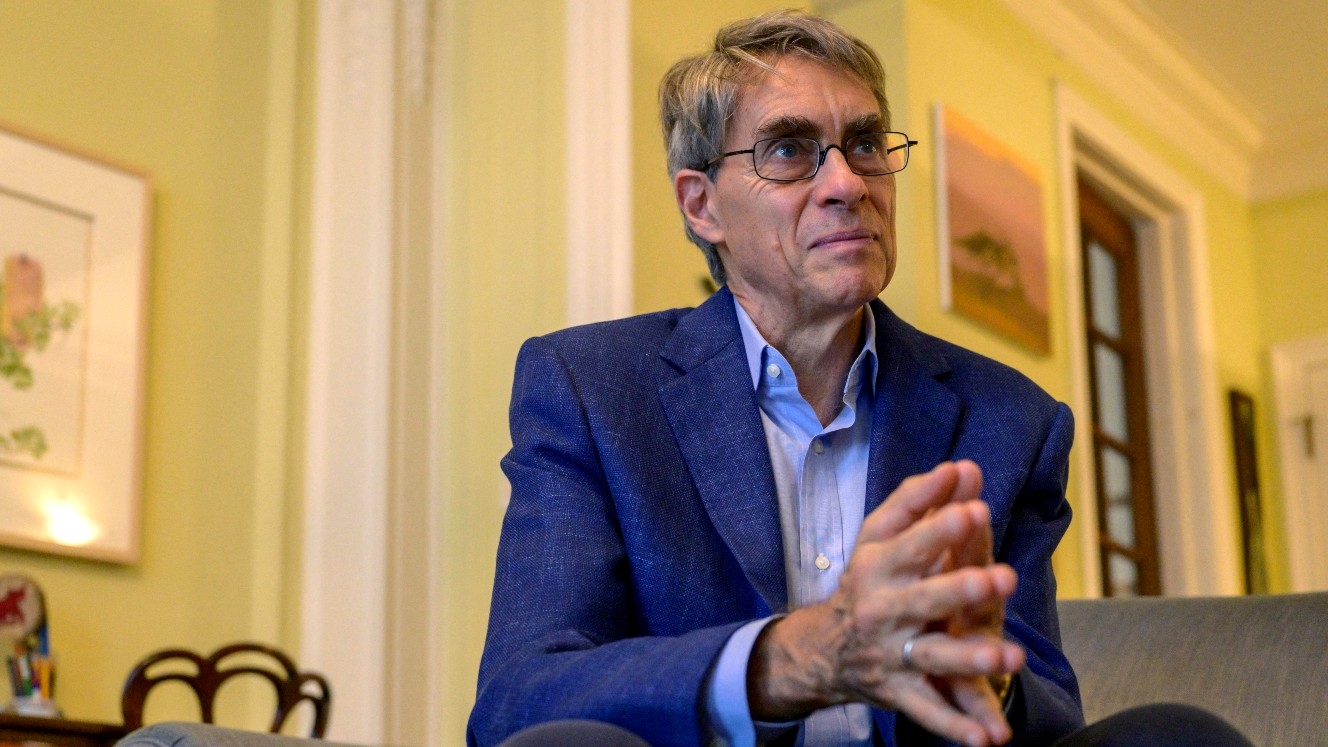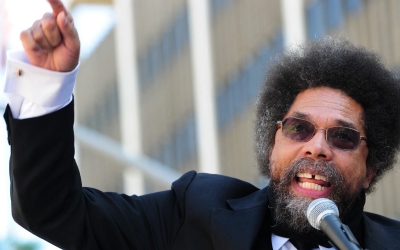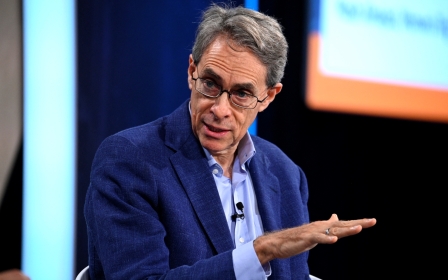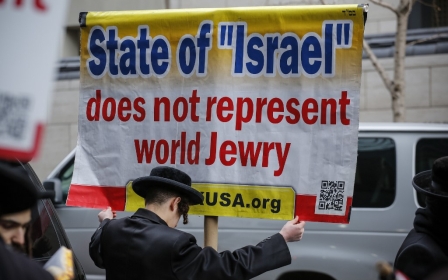‘Criticise Israel, you can be cancelled’: Outrage after former HRW chief denied Harvard fellowship

Harvard University's decision to deny a senior fellowship position to the former head of Human Rights Watch has led to a wave of outrage and concern over the restriction of academic freedom when it comes to criticism of Israel's treatment of Palestinians.
Roth, who stepped down from HRW last year, told Middle East Eye in an interview that the decision by the Harvard Kennedy School's Carr Center for Human Rights, which he said has to do with his criticism of Israel, "shows that criticism of Israel is still very difficult to do in major universities".
'It speaks really poorly for the range of respectable discourse particularly in a school ... that claims to pride itself on a diversity of perspectives'
- Kenneth Roth, HRW's former executive director
"It speaks really poorly for the range of respectable discourse particularly in a school - the Kennedy School - that claims to pride itself on a diversity of perspectives, on the willingness to take on difficult subjects, and the willingness to have debate. And apparently, that's true for anything but Israel," he said.
Roth told MEE that while he was shocked by the decision, his major concern was the possible effect that this could have on lesser-known academics as well as Palestinians in US universities.
"My personally being denied this fellowship is not going to stop me from speaking. But I worry about younger academics who are watching this sorry episode and are taking away the lesson that if you criticise Israel, you can be cancelled, your career can be stymied," he said.
New MEE newsletter: Jerusalem Dispatch
Sign up to get the latest insights and analysis on Israel-Palestine, alongside Turkey Unpacked and other MEE newsletters
The decision has already led to a major backlash, with hundreds of people calling for the resignation of Doug Elmendorf, dean of the Kennedy School at Harvard, which is based in Cambridge, Massachusetts.
In a statement sent to the AP, the Harvard Kennedy School said that Elmendorf “decided not to make this fellowship appointment ... based on an evaluation of the candidate’s potential contributions to the Kennedy School”.
But Kathryn Sikkink, a professor at the Kennedy School, told the AP that when she went to Elmendorf to ask for an explanation, he informed her that Roth's fellowship would not be approved "because they considered HRW and Roth to have an anti-Israel bias”.
On Tuesday, the Harvard Kennedy School Palestinian alumni collective, which represents 45 Palestinian alumni of the school, released a statement demanding Elmendorf's resignation and for Roth to be instated as a fellow.
"It is egregious that Dean Elmendorf’s decision to withdraw Roth’s fellowship appointment to the Carr Center for Human Rights was due to Roth’s criticism of Israel’s mistreatment of Palestinians," the statement said.
Then, Harvard's student newspaper, The Crimson, as well as the Boston Globe, reported that another letter from more than 350 affiliates and co-sponsored by more than a dozen student groups was sent to Harvard's president similarly demanding the Kennedy School dean's removal.
"For the sake of academic freedom at Harvard and human rights globally, Dean Elmendorf must resign and Harvard Kennedy School administration must reverse this decision and reconsider Ken Roth as an invited fellow for the 2023-24 academic year," the open letter said, as reported by The Crimson.
Middle East Eye reached out multiple times to the Kennedy School for comment, but did not receive a response by the time of publication.
'Do you have enemies?'
Roth said that after he had announced stepping down from HRW in April 2022, the Kennedy School's Carr Center for Human Rights Policy reached out to discuss offering him a fellowship.
After a bit of back and forth, he agreed in principle and was told to deliver a CV along with a proposal of what he would do during the fellowship period. He had planned to work on a book he has been writing about his time at HRW.
The fellowship proposal was then sent for approval to the Kennedy School's dean, a step in the process that was thought by Roth and members of the Carr Center to be a simple formality.
On 12 July, Roth said he had a meeting with Elmendorf, who posed a question that struck Roth as strange. The question was: "Do you have any enemies?"
"It struck me as a really odd question because obviously, you can't head Human Rights Watch without making enemies left and right. And so I sort of sloughed it off by explaining that yes, I've been personally named as having been sanctioned by both the Chinese government and the Russian government," he said.
"But I had a hunch what he was driving at, so I said, and the Israeli government isn't happy with me. We didn't spend a lot of time elaborating on it. But it was clearly Israel that he was focusing on, as later became clear."
Two weeks later, Roth said Sikkink, a professor at the Kennedy School, told him he was denied the fellowship because of HRW's criticism of Israel.
Roth has been a vocal critic of the Israeli government, and it was under his leadership HRW released its 2021 report stating that Israel's practices were a form of apartheid.
But Israel has been just one target of the human rights advocate, and HRW reports on rights issues in 100 countries.
The news of the fellowship denial was first reported by The Nation last week. The newspaper said that several major donors to the Kennedy School are also ardent supporters of Israel.
"We don't know for sure whether Elmendorf discussed my fellowship with [donors], or anticipated their possible reaction. But I have a hard time thinking of any other explanation," Roth said.
"Because it's not as if I'm not qualified for the fellowship and Elmendorf is not known to have strong views on Israel - he doesn't have any public record on it. So I don't think personal animosity is what's at stake here."
After the reports that he was denied the fellowship, several pro-Israel groups welcomed the news and Roth was also attacked with claims of antisemitism. Gerald Steinberg, founder of the Israel-based organisation NGO Monitor, said on Twitter that Roth was using "(thin) Jewish roots as a shield from accountability for 30 years demonizing Israel".
"God knows what he was talking about. My father was Jewish and fled the Nazis. My mother was Jewish. I'm 100 percent Jewish," Roth told MEE.
The stifling of Palestinian speech
The incident at Harvard has led to a deeper conversation regarding the extent to which criticism of Israel is allowed on university campuses.
In 2021, activist, philosopher, and academic Cornel West resigned from the Harvard Divinity School, and in his resignation letter, he cited the institution's "deference to anti-Palestinian prejudices" as one of his reasons for stepping down.
Laila El-Haddad, who is originally from Gaza and attended Harvard Kennedy School in 2002, said that the denial of Roth is one of many incidents showing a bias towards Israel, and it is also a troubling precedent for Palestinian academics who speak out against Israel.
"We feel like this is sort of like the icing on the cake, and is sort of indicative of a broader anti-Palestinian climate that we've seen developing over the years and has sort of come full circle under the leadership of this specific dean," she told MEE.
"It's, I would say, one of a series of dangerous precedents that's already been set in academia with regards to silencing completely any voices on Palestine."
Haddad is one of the co-conveners of the Harvard Kennedy School Palestinian alumni collective, which drafted the statement calling for the dean's removal.
Roth said he understands the sentiment of the Palestinian affiliates of Harvard, especially given that there are other academics who are even more critical of Israel than he is.
"I can understand their feelings because it's not as if my criticism of Israel is outside the mainstream."
"If donor objections, real or anticipated, are behind this, it impoverishes the discourse at the Kennedy School, and understandably leaves Palestinians, or frankly anybody who is willing to look at the Israeli situation objectively, thinking that their views are not welcome."
Nancy Murray, a Cambridge-based activist who attended Harvard for her bachelor's degree, said she hopes the students continue pushing for answers from the administration and that the outrage is maintained and leads to a turning point for the issue of stifling criticism of Israel.
Murray, who is the co-founder of the Gaza Mental Health Foundation, noted that in Massachusetts, freedom of speech is a right that is of major importance to its residents.
Unlike dozens of other states in the US, Massachusetts did not adopt anti-BDS legislation after opposition from local activist groups.
"I think it's possibly a turning point because what the tendency that's been developing in this country now is really visible, namely the behind-the-scenes censoring and silencing on all levels," Murray told MEE.
"If it were at a different institution, I would think okay, this is going to sink without a trace. But I think here, I think people will keep pushing."
This article is available in French on Middle East Eye French edition.
Middle East Eye delivers independent and unrivalled coverage and analysis of the Middle East, North Africa and beyond. To learn more about republishing this content and the associated fees, please fill out this form. More about MEE can be found here.






